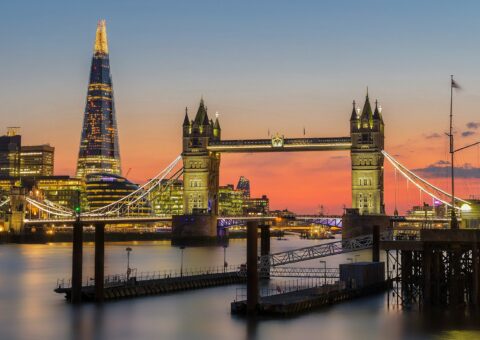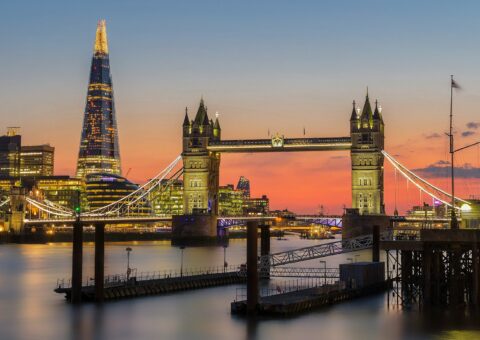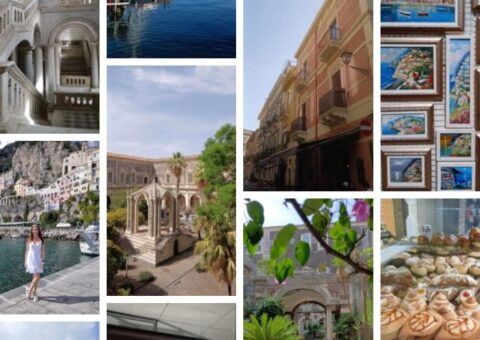Moving to Portugal: Everything You Need to Know
Coming up: beachside lazing, sipping and munching, dog-friendly parks, a snake-like fish, excellent schools and universities, lots of bureaucracy, and everything you need to know about moving to Portugal.
Hello you!
You’ve clicked on this guide.
… you’re reading these words.
So: we reckon you’re considering moving to Portugal.
Good choice!
(by the way: if our instincts were wrong here, feel free to close this tab and move on)
Right now, around 1.2 million foreigners live in the nation (which is over 11% of the total population). And because there are many visa options (including a new digital nomad visa!), relocating to Portugal is becoming easier.
In short, Portugal is a popular place to find a new home.
Perks of making the move include good weather, low prices, friendly people, and lots of beaches—but we’ll come to all that later.
Today, your relocation-lovin’ friends at Homelike are taking you on a tour around Portugal. Bring your passport and come join the fun!
Why relocate to Portugal?
Perks of moving to Portugal include:
- Excellent weather: obviously, one of the biggest positives of relocating to Portugal. In summer, average highs can be 28°C (83°F), while average winter lows in major cities rarely dip below 45°C (7°F). We’ve covered this in more detail soon, but here are more stats.
- Low cost of living: compared to the rest of western Europe, Portugal is surprisingly affordable. And if you head to smaller, lesser-known cities (ie, not Lisbon or Porto), you can find a very low-cost life.
- A hefty coastline: Portugal’s coastline has a total length of almost 1,800 km (1,100 miles), and includes over 350 beaches. Expect sunbathing, watersports, long-distance hikes, coastal villages, and secluded sands.
- It’s very safe and welcoming: but more on that soon!
- It’s easy to feel at home: Portuguese people are open and friendly, many of them speak good English (especially in bigger cities), and there are lots of other expats living in the country. Add all that together, and it’s easy to feel welcome.
- Laid-back lifestyle: many people are moving to Portugal for the slower pace of life. The work-life balance is great, and people value time with friends and family. Compared to other parts of western Europe, people here aren’t so fixated on productivity and punctuality. You’ll also find many things to do—but more on that later.
- World-class food and drink: if you’re moving to Portugal, expect to get your mouth around a bunch of tasty treats.
- Good education, medical care, and other amenities and facilities: good news if you’re older, or if you’re moving to Portugal with kids.
- Just for a bit of balance, some negatives of relocating to Portugal include low salaries, inefficient bureaucracy, and surprisingly-cold winters (because central heating is not common in the nation!).
But for us (and probably for you!) the positives VASTLY outweigh the negatives.
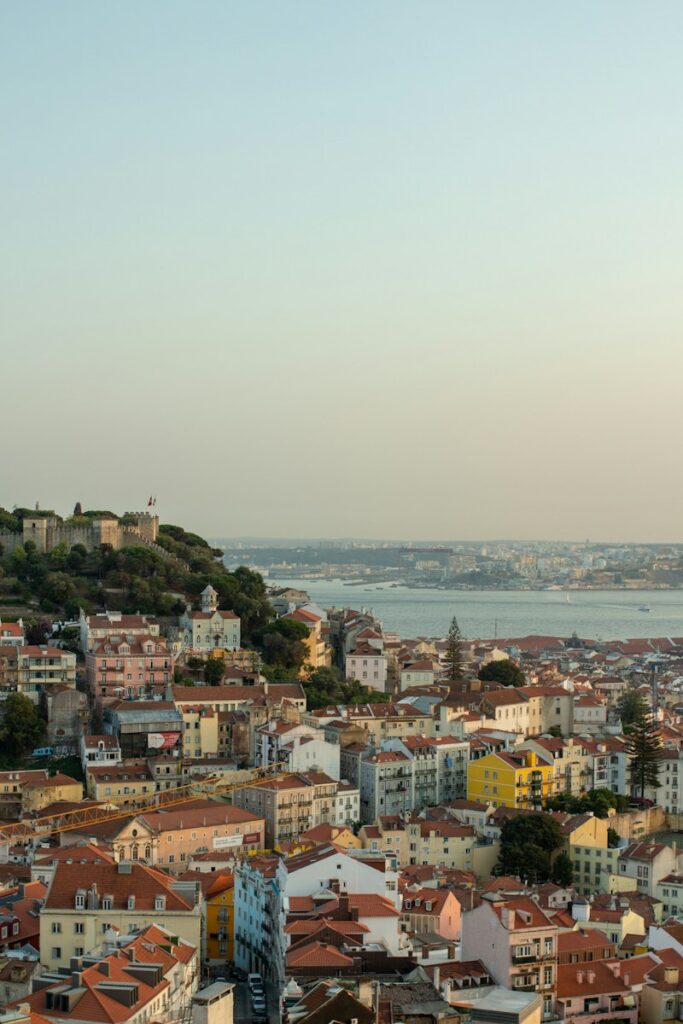
Do I need a visa to live in Portugal?
That depends on where you’re moving to Portugal from.
If you’re moving to Portugal from another part of the EU/EEA area, you DON’T need a visa. And if you’ll be staying fewer than three months, you don’t need to do anything at all! If you’ll be staying longer than three months, you need to apply for a registration certificate at your nearest city council office (within 30 days of arriving)—and that’s the only major bureaucratic thing you need to do.
If you’re not from the EU/EEA area, things are more difficult. Though many nationalities can enter Portugal for up to 90 days with no visa, you’ll need some type of visa if you’ll be hanging around for any longer.
Most people reading this will want to apply for some type of residency visa (the most popular categories are for working and studying)…
… but other options include The Golden Visa (which is basically an investment visa—the most popular option is to qualify by spending €500,000 on a local property), the Retirement Visa, and the temporary stay visa (which allows you to stay in Portugal for between 3 and 12 months).
Digital nomads relocating to Portugal will be interested in the digital nomad visa (or, as it’s also known, the ‘D8 visa’). It’s for digital nomads, remote workers, and freelancers. It allows you to stay in Portugal for between 1 and 5 years—but you need to earn FOUR TIMES the Portuguese minimum wage (so, at present, you need to be earning around €3,040 or more per month)
If you’re moving to Portugal from the UK, you need to follow the exact same rules as any other person from any other non-EU/EEA part of the world.
Is learning Portuguese necessary?
For moving to Portugal, it’s (of course) a good idea to learn Portuguese:
… daily life will be easier, local people will appreciate your attempts to get involved, you’ll be better at bargaining and bureaucracy, and you’ll be able to communicate with everyone (because, understandably, many older people in Portugal don’t speak English).
To get started, use Duolingo… which, as you probably know, is essentially a fun colorful easy-to-use game.
For taking your learning to the next level, try Babbel, Rosetta Stone, LingoClip (where you learn by listening to Portuguese music!), and Pimsleur (which places a big focus on speaking and listening).
For one-on-one online classes, use Preply. Or, if you want to learn in-person (and make friends!), find a language school in whichever Portuguese city you’ll be living in. Here’s more.
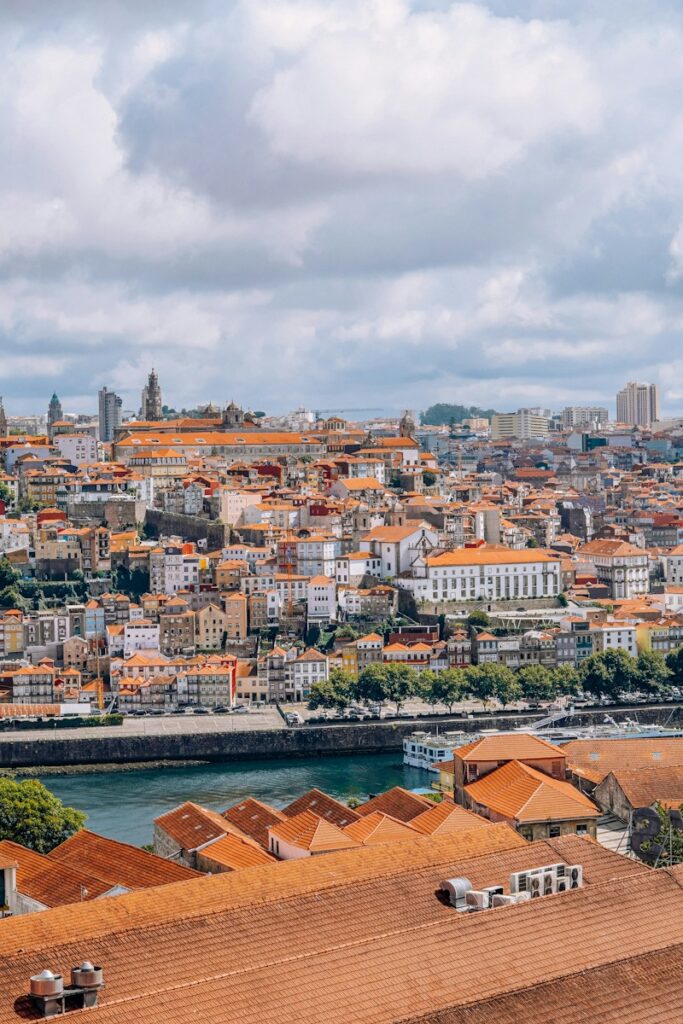
How much does living in Portugal cost?
That depends on where you’re living.
But here are some basic cost-of-living stats for popular locations:
Lisbon
- 1-bedroom apartment in the city center: €1,250
- Regular monthly pass for local public transport: €40
- Meal for 1 at an inexpensive restaurant: €13
- Regular cappuccino in a cafe or restaurant: €2.10
- 12 regular eggs from a supermarket: €2.84
Porto
- 1-bedroom apartment in the city center: €900
- Regular monthly pass for local public transport: €40
- Meal for 1 at an inexpensive restaurant: €9
- Regular cappuccino in a cafe or restaurant: €1.45
- 12 regular eggs from a supermarket: €2.76
Faro
- 1-bedroom apartment in the city center: €1,000
- Regular monthly pass for local public transport: €30
- Meal for 1 at an inexpensive restaurant: €10
- Regular cappuccino in a cafe or restaurant: €1.37
- 12 regular eggs from a supermarket: €2.38
Setubal
- 1-bedroom apartment in the city center: €830
- Regular monthly pass for local public transport: €40
- Meal for 1 at an inexpensive restaurant: €10
- Regular cappuccino in a cafe or restaurant: €2.27
- 12 regular eggs from a supermarket: €3.16
Braga
- 1-bedroom apartment in the city center: €790
- Regular monthly pass for local public transport: €30
- Meal for 1 at an inexpensive restaurant: €9
- Regular cappuccino in a cafe or restaurant: €1.59
- 12 regular eggs from a supermarket: €2.66
We’ve taken these figures from Numbeo—it’s great for finding cost-of-living stats.
What kind of accommodation options are available in Portugal?
To buy a home after moving to Portugal, look at ReMax and Idealista (the nation’s two most popular real estate websites). But, ideally, we recommend working with an agent—unless you speak fluent Portuguese, and understand the culture and bureaucracy of the nation, buying a home can be tough.
The best websites for finding rentals are Homelike, ReMax, and Idealista. Other people use AirBnB, while many also like to use Facebook. To use Facebook, go to the search function, and type phrases such as ‘rentals in [city name]’ and ‘apartments in [city name]’.
… but as you’ll soon come to learn (as most other people do after moving to Portugal!), finding a place to live is one of the hardest parts of relocating to the nation:
Many landlords don’t speak English, locals have an advantage over you, some apartments are unfurnished, it’s hard to know what price is a fair price, and you often spend weeks viewing apartments and negotiating with landlords.
Because of these problems, many Portuguese newcomers decide to move into serviced apartments. These places are all fully-furnished, and they’re all ready to move into right away. So you don’t need to do any viewing or negotiating, you don’t need to deal with landlords or language barriers, and you know you’re getting a fair price.

Understanding residency registration in Portugal
After relocating to Portugal, EVERYONE is legally required to register their residence.
As mentioned, this is simpler for people from another part of the EU/EEA area: you only need to apply for residence if you’ll be in the nation for longer than three months. The process is quick and easy, but you need to prove you’re studying, or working, or have enough money to sustain your stay. Here’s everything you need to know.
If you’re moving to Portugal from outside the EU/EEA area, you first need to get the correct visa. After this visa has been approved, you’ll arrive in Portugal. After you arrive in Portugal, you then need to visit your nearest immigration office (SEF) to apply for your temporary residence permit. Here’s much more detail.
Usually, for non-EU/EEA citizens, your residency is valid for one year. You can then renew it for a further two years, twice. After that entire five-year-period is over, you are able to apply for permanent residency.
What's the healthcare system like in Portugal?
Portugal’s healthcare is some of the best in the world—the nation’s care and facilities ranked #22 in the FREOPP 2022 World Healthcare Index.
If you have legal residency, you can use the nation’s public healthcare system (the ‘Serviço Nacional de Saúde,’ or ‘SNS’). After you get your residency, you’ll receive a social security number (NISS). You then use this NISS to register at your local health center, and you get the same public healthcare rights as a longlife resident.
Public healthcare is paid for by social security, but is free to access. That said, you need to pay for medication, and for some specialist treatments.
After relocating to Portugal, many people prefer to use the private healthcare system. Although public healthcare is great, private healthcare is even better (with shorter waiting times, better specialist care, and higher standards). To get a private policy, the best insurers are the big names (like Cigna, AXA, and Allianz).
Note: if you’ll be in Portugal for three months or fewer, you of course can’t use the public healthcare system. That said, you can access some public healthcare if you have an EHIC (European Health Insurance Card).
What should I know about the Portuguese education system?
If you’re relocating to Portugal with kids, we’ve got good news:
In the 2021 ‘Best Countries Report,’ Portugal ranked 25th in the world for education. You get good schools, good teachers, and very high standards.
In Portugal, education is mandatory between the ages of 6 and 18 (primary school from 6 to 15; secondary school from 15 to 18).
You’ll find many international schools (British, American, French, and German)—but most are located in big cities. Typically, these international schools cost around €5,000 a year. Of course, if you’re a resident, you’re also entitled to free-of-charge public education; but all public education is in Portuguese.
Portugal is also in the top 20 countries in the world for 18+ education. Higher education is popular and widespread here—you’ll find many universities across the nation (including over 30 in Lisbon alone!).
Of course, if you’re coming to Portugal for university, it’s best to move to a big city (you get more choice, more English-speaking courses, more expats to make friends with, better nightlife, and more things to do).
How to find employment in Portugal?
The best places for finding a job after moving to Portugal are Empregos Online, Indeed.pt (both of which are Portuguese-language websites), English Jobs Portugal (for nabbing English-speaking jobs), and good ol’ LinkedIn.
Some people also use recruitment agencies. In bigger cities, you can even find recruitment agencies specializing in finding English-language jobs.
According to TimeDoctor, average salaries in Portugal are around €2,750 per month.
How can I open a bank account in Portugal?
To open an account at a traditional branch-style bank after relocating to Portugal, head to Millennium BCP, Caixa Geral de Depositos, or Santander.
You’ll usually need photo ID (e.g., a passport), your NIF number (more on that next), and proof of address (even if that address is temporary).
That said, we recommend getting an online account—they’re quicker to get, easier to manage, and you won’t have any language barriers. All you need to do is download an app, fill in some details, and (usually) provide the documents listed above. The best online options are N26, Openbank, and Revolut.
What is an NIF number?
Your NIF number, is your ‘Número de Identificação Fiscal’…
… and it’s basically just a taxpayer identification number.
But even though it’s a simple thing, it’s a key part of moving to Portugal. Everyone needs one of these numbers: to pay tax, open a bank account, register your address, and more.
You can use the online portal to start the registration process, or you can make an appointment at your local tax office. Here’s more information.
What should I know about transportation in Portugal?
After relocating to Portugal, you’ll find big-city public transport is excellent:
In places like Porto, Lisbon, Braga and Faro, it’s easy to get around with no car. Most cities have numerous forms of transport… including trains, metros, buses, trams, and more.
It’s also easy to get between major places (by both train and long-distance bus). There are a huge number of railway stations in Portugal (timetables and prices here). And coach companies like EVA Transportes and Rede Expressos cover huge portions of the country.
But if you want to reach more remote and rural areas, it’s best to have a car.
Cycling is possible, but not as easy as it is in other parts of western Europe. Though Portugal’s long-distance cycling is great, cities aren’t really set up for two wheels: Porto and Lisbon are hilly, infrastructure isn’t great, many streets are cobbled, and drivers aren’t particularly courteous to cyclists.
Though there are 7 international airports in Portugal, only three of them are well-connected: Lisbon, Porto and Faro.
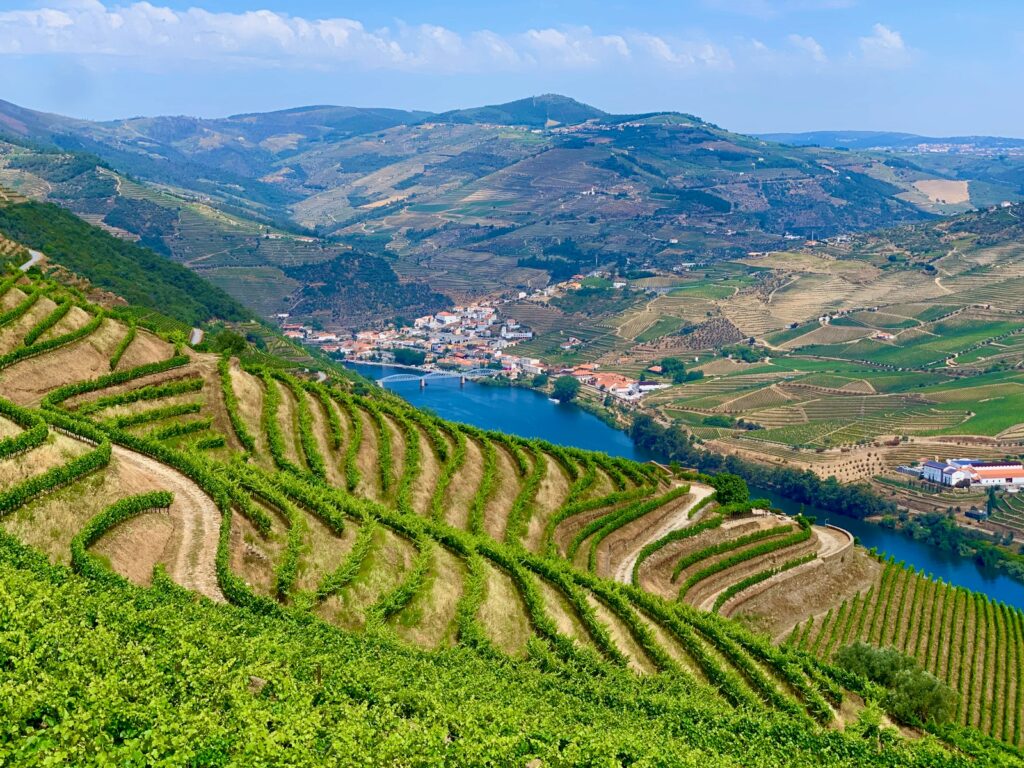
What should I know about Portuguese cuisine?
Portuguese food is MASSIVELY underrated.
Here’s what you’ll be getting your mouth around after moving to Portugal:
- Francesinha: much-loved in Porto, this taste-packed greasefeast is a meaty cheese sandwich, sometimes topped with a fried egg. It’s then placed into a bowl, covered with sauce, and served with fries.
- Cheese: though you might not know it, Portugal loves cheese. The nation is home to a bunch of different varieties… and must-tries include Queijo de Cabra Transmontano (a hard goat’s cheese), Requeijão da Beira Baixa (a type of cottage cheese), and Queijo de Azeitão (sort of like camembert).
- Pork: although Portuguese people eat all the meats, pork is particularly popular. Expect cured meats, belly pork, sausages, and pork stewed in its own juices.
- Rice! Portuguese people eat more rice than any other nation in Europe. Known as ‘arroz’ in the nation, rice-based dishes include rice with duck, and rice with seafood.
- Lots of seafood: with a massive coastline comes a massive amount of seafood—and Portugal eats more seafood than most European nations. Top treats include cuttlefish, octopus, sardines, and seafood stews. Odder dishes include lamprey and goose barnacles.
- Many fruits and vegetables: a Mediterranean climate means lots of fresh produce!
- Desserts: famous sweet treats include flan, rice pudding, Bola de Berlim (which are sort of like donuts), and the iconic pastel de nata.
What's the climate like?
Portugal is one of the hottest countries in Europe… and the further south you go, the warmer it gets. The annual average temperature across the nation sits at a massive 21°C (70°F).
The nation is a little rainier than most people expect (especially in the north). Although rain typically peaks in spring, you get rainy days year-round.
Because Portugal sits further south than most of Europe, it also offers more annual daylight. June serves up 14 hours of daylight per day, while even January has up to 10 hours per day.
In terms of broad differences, Lisbon is the rainiest city in Portugal, while the south coast (including Faro) is particularly hot.
What are the best places to live in Portugal?
- Lisbon: the natural choice for most people moving to Portugal. With a population of 500,000, the Portuguese capital is the nation’s biggest city. Perks include world-class nightlife, a huge number of other expats, low prices for capital-city standards (it’s around 42.5% cheaper than London), and a cosmopolitan vibe.
- Porto: the nation’s second-biggest city, Porto offers a combo of hills and beaches, excellent fortified wine (yep, this is where port comes from), great year-round weather, and a growing community of digital nomads. Other perks include a great cafe scene (with excellent coffee), and a combo of big-city vibes and community ones.
- Faro: capital of the iconic Algarve, Faro combines beach fun with big-city conveniences. Expect hot weather, super-close proximity to the city’s airport, and many nearby coastal towns. The city itself is surprisingly small, but has all the amenities you need.
- Setubal: a 40-minute drive south of Lisbon, a good choice for relocating to Portugal if you want to be relatively close to both the capital and the Algarve. You get excellent (and quiet!) beaches, lots of old-school markets, great cycling, friendly locals, and fewer expats than the big hotspots.
- Braga: a 40-minute drive north of Porto, Braga is a little more traditional and religious than most other parts of the country. It’s great for hiking and cycling. You also get lots of conveniences without too much bustle—if you’re moving to Portugal for local vibes, you’ll love living in Braga.
What's the social scene and entertainment like?
If you like making friends, staying out late, and finding things to do, moving to Portugal is a good choice:
You’ll find lots of bars, clubs, and cafes—and Lisbon specifically is one of Europe’s best cities for nightlife. Across the nation, socializing can be pretty affordable—as we’ve covered, food is pretty low-cost, while coffee and alcohol are cheap. Even in Lisbon, an average domestic half-liter beer costs only €3.
The nation is home to more than 300 museums and galleries, while other noteworthy perks include the nationwide love of fado (a traditional type of dance), good football, many outdoor food venues, and great weather (so you’ll always find people hanging out and picnicking in parks).
Note: overall, Portuguese people are very friendly, warm and welcoming. That said, it can take a while to make ‘real’ friends here. But if you make an effort to learn the language and pursue your hobbies, you’ll be fine.
What are some Portuguese festivals and holidays?
Because Portugal is a majority Catholic country, you’ll find many religious events and festivals. They include:
- Festa das Cruzes (featuring traditional songs, dances, and processions)
- Semana Santa (the holy week over Easter)
- The Fatima Pilgrimage
- … and Christmas!
Major music festivals include:
…while some of the more unusual events you’ll find after moving to Portugal are Festa dos Tabuleiros (in which women wander around with bread on their heads), Festas dos Rapazes (with its pagan roots), and Madeira’s color-packed flower festival.
Here’s a big list of all Portugal’s top events and holidays.
Is Portugal pet-friendly?
Yep, Portugal is VERY pet-friendly.
Almost 40% of Portuguese households have dogs, anti-cruelty laws are strict, you’ll find many dog-friendly parks and cafes, and you can even take pets on some public transport.
But if you’re relocating to Portugal with pets, there are many rules and regulations you need to follow. For example, your pets must be microchipped and vaccinated, they can’t be pregnant or under 12-weeks old, and they need a pet passport.
Note: in bigger cities, it can be very tough to find pet-friendly apartments. If you struggle, we have plenty for you!
Is Portugal safe?
Yes, Portugal is very safe.
After relocating to Portugal, you’ll find:
- Safe roads and public transport
- Low risk of natural disasters
- Low risk of terrorism
Yes, there’s a vague risk of mugging and pickpocketing, but it’s very rarely violent. And if you keep your valuables hidden away, you probably won’t be targeted.
What should I know about internet and telecommunications in Portugal?
After moving to Portugal, you’ll find the nation’s connectivity excellent. As you’ll see here, in June 2022, “SpeedTest.net ranked Portugal 19th in the world for median fixed broadband speeds.”
Obviously, the more remote you go, the worse the internet will get. So if you’ll be working online, you should stick to the bigger cities.
Portugal’s most popular internet service providers are MEO, NOS, and Vodafone (all three are also excellent phone package providers). Typically, 1 month of unlimited data for a household will cost around $36.
Where can I shop for groceries and other items?
After relocating to Portugal, you’ll find old-school indoor-style markets (‘mercado municipal’) are still very popular. In these indoor markets, independent sellers all come together under one roof: and you’ll find grocers, bakers, butchers, fishmongers, and more.
But you’ll of course still find plenty of supermarkets throughout the nation. The biggest and most popular names are Continente, Pingo Doce, Aldi, Lidl, and Auchan.
Other things to know:
- Many larger supermarkets have pharmacies inside them
- Supermarkets are usually open 7 days a week—but they might have shorter opening hours on Sundays
Broadly, the biggest supermarkets usually lie outside of city centers (though you’ll find medium-sized supermarkets in the centers of bigger cities)
Moving to Portugal from the US
If you’re moving to Portugal from the US, you need to follow the same visa rules we outlined earlier. Yep, you can enter the nation visa-free for up to 3 months—but if you want to stay any longer, you’ll need a visa.
Cultural differences you can expect include:
- Healthcare is more affordable (public healthcare entitles you to free care, and private care is way cheaper than US private healthcare)
- There’s no real tipping culture: but leaving a tip of around 5-10% is pretty normal
- You get fewer international food options (even in big cities)
- People in Portugal have a better work-life balance
- People don’t like to talk about money
- Portuguese public transport is better
Moving to Portugal from the UK
Again, because of Brexit, moving to Portugal from the UK is now harder than it was. As outlined earlier, you’ll need to follow the same rules any other non-EU/EEA people have to follow (just like Americans do).
Compared to the UK, life in Portugal is warmer, more affordable, and has a more relaxed pace. People typically go to bed a little later, and wake a little later.
Some cultural differences you might find:
- People from Portugal are more touchy than people from the UK—kissing and hugging are more common
- Portuguese people aren’t as punctual as UK people
- Portuguese people are more direct than UK people
- Bureaucracy is a little slower and less organized
- Portuguese people are more family-oriented
- Supermarkets don’t have as much variety
- You get fewer international food options
- Private healthcare is more affordable
Moving to Portugal: final thoughts
Okay—that’s everything you need to know about moving to Portugal!
As we’ve (hopefully!) made clear by now, it’s a great place to live. And we definitely recommend the move.
… but we also recommend moving into a serviced apartment.
One of the hardest parts of moving to Portugal is finding a good apartment in Portugal. But if you move into a ready-right-now fully-furnished place, you don’t need to spend endless hours searching and negotiating, you don’t need to struggle with language barriers, you don’t need to attend any viewings, and you won’t get ripped off.
But, no matter which type of apartment you move into, we reckon you’ll love living in Portugal.
Thanks for reading, and thanks for choosing Homelike. See ya!






